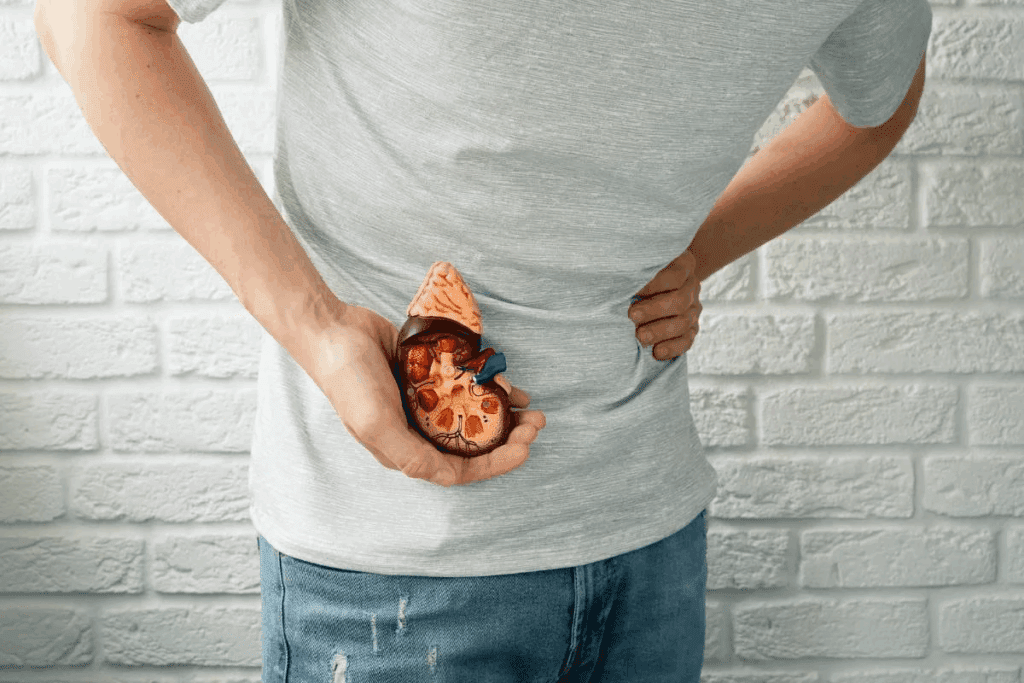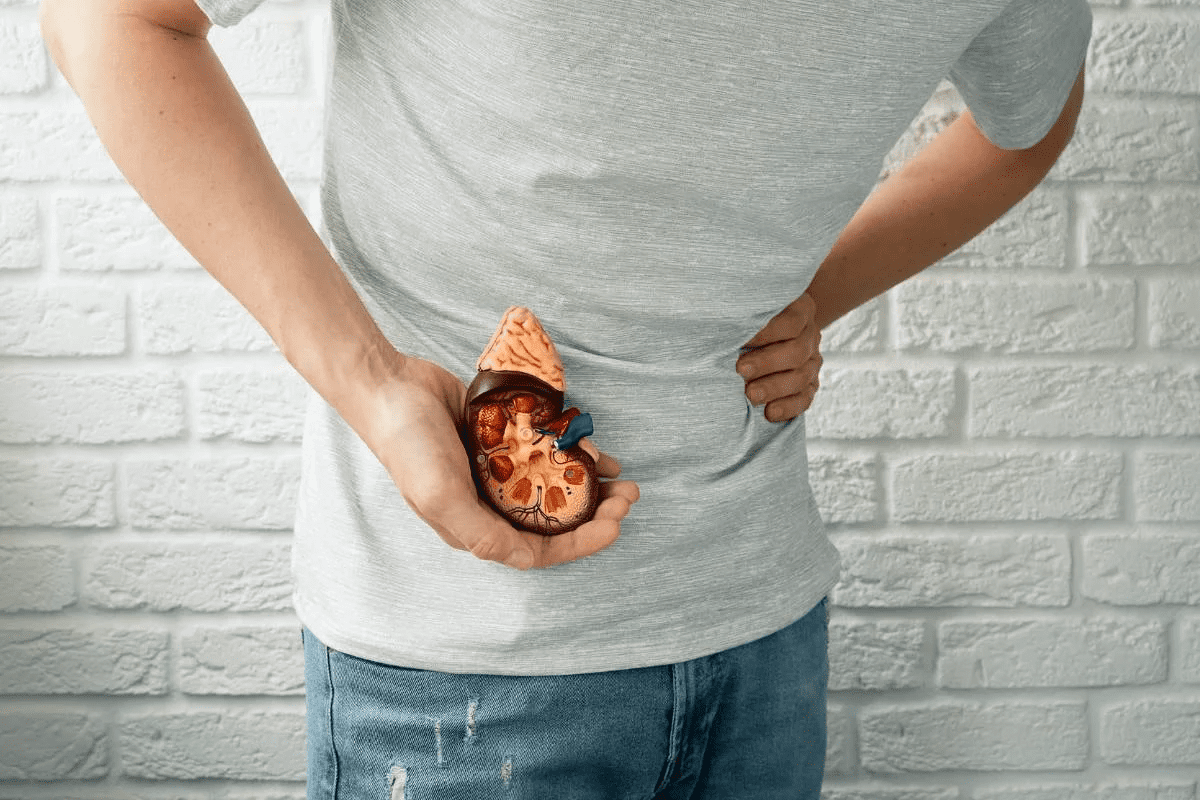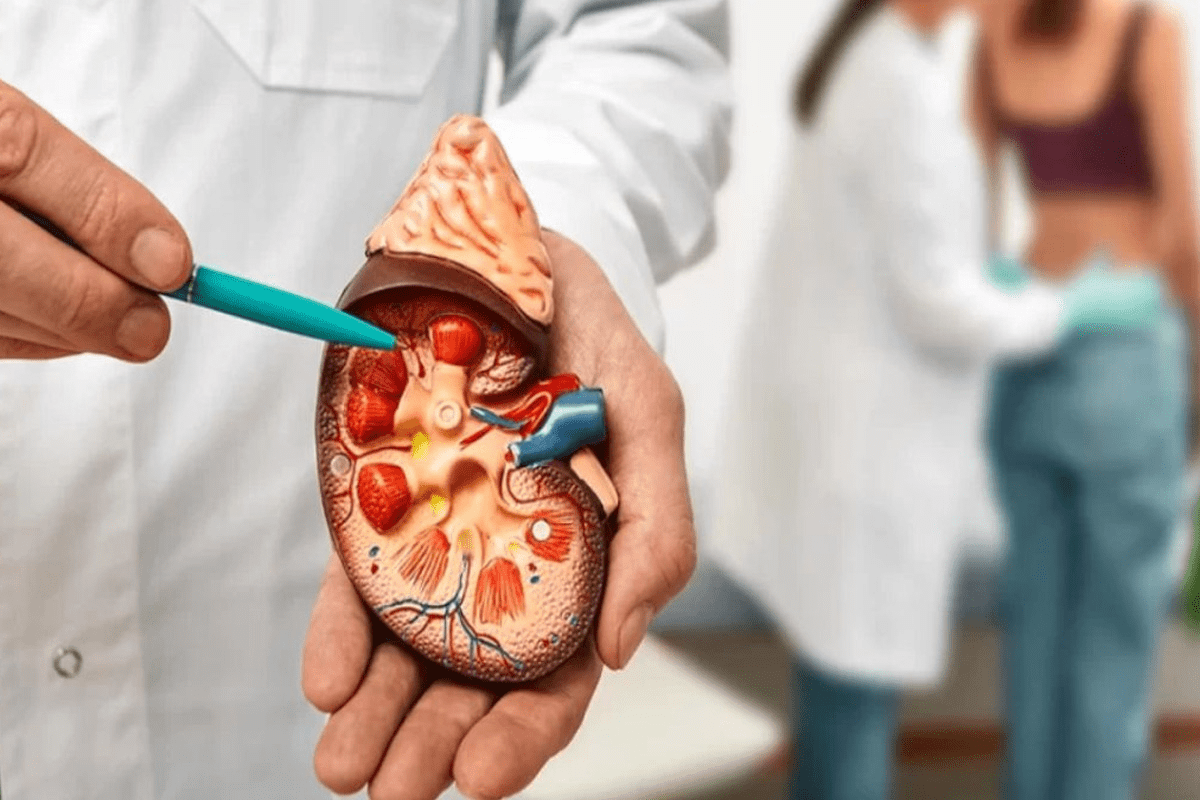
We often talk about how kidney stones and stomach health are connected. This link affects millions of people around the world. Every year, about 600,000 Americans get kidney stones. Many of them also have stomach problems like nausea and constipation.
The connection between stomach problems and kidney stones is not simple. Scientists are working hard to understand how they affect each other. At Liv Hospital, we use the latest tests and care to help with these health issues.
Can kidney stones cause heartburn? Learn about the link between renal pain, referred pain, and the onset of gastrointestinal symptoms.
Key Takeaways
- Kidney stones affect approximately 600,000 Americans annually.
- Gastrointestinal symptoms are common among those with kidney stones.
- The relationship between kidney stones and GI health is complex and multifaceted.
- Advanced diagnostic protocols are key to understanding this connection.
- Comprehensive patient care is vital for tackling related health challenges.
The Prevalence and Impact of Kidney Stones
It’s important to know about kidney stones for both patients and doctors. These stones are a big health issue because they often come back. They can also cause a lot of pain and other problems.
Statistics on Kidney Stone Occurrence in the United States
Kidney stones hit about 12% of the population at some time. If you don’t take steps to prevent them, 50-80% of people will get another stone within 10 years. This shows why it’s key to know the risks and how to avoid them.
Kidney stones are a big problem in the United States. They’ve become more common over the years. This is because of things like diet, climate, and genetics in some areas.
Common Symptoms and Complications
The signs of kidney stones can vary. They often include severe pain in the side or back, below the ribs. This pain can also spread to the lower abdomen or groin. Other signs might be nausea, vomiting, and trouble urinating. If the stone blocks something, it can lead to infection or damage to the kidney.
If you think you have kidney stones, you should see a doctor. They can help manage the pain and prevent more problems. Doctors can also tell you how to avoid getting stones in the future.
Understanding the Anatomy: Kidneys and the Digestive System
It’s important to know how the kidneys and digestive system work together. The kidneys filter waste from the blood and are located in the back of the abdomen. The digestive system, which includes the stomach, small intestine, and colon, is nearby.
The kidneys and digestive system are not just next to each other by chance. They are connected through complex processes. This connection affects how they work together and can cause pain and other symptoms.
How the Urinary and Digestive Systems Interact
The kidneys and digestive system interact in many ways. For example, the kidneys make urine, which goes to the bladder through the ureters. This happens close to the digestive organs. The shared nerve pathways can cause pain and other symptoms in the digestive system during a kidney stone episode.
- The ureters are near the intestines and can cause discomfort when a stone is present.
- Pain from a kidney stone can feel like it’s coming from the lower abdomen, making it hard to tell if it’s a digestive issue.
- The body’s pain response can also affect digestion, leading to nausea and vomiting.
Shared Nerve Pathways and Pain Perception
The nerves that connect the urinary and digestive systems play a big role in how kidney stones affect the gut. The nerves that carry pain from the kidneys also affect other parts of the abdomen. This can lead to complex pain patterns.
- The nerves from the kidneys and digestive system share common pathways.
- This shared innervation can cause referred pain, where the pain from a kidney stone feels like it’s coming from another area, like the lower abdomen or groin.
- The brain can have trouble figuring out where the pain is coming from, mixing up kidney stone pain with digestive issues.
Understanding these complex connections helps us see how kidney stones can cause gut symptoms. It shows why treating kidney stones needs a full approach.
Can Kidney Stones Cause Heartburn? The Direct Connection
Kidney stones may lead to more than just pain in your back. They can also cause heartburn and other stomach issues. Let’s dive into why this happens and what studies say about it.
Research on Kidney Stone-Related Acid Reflux
Research shows a link between kidney stones and acid reflux. People who have had kidney stones are more likely to have acid reflux. This connection is worth looking into further.
Kidney stones might affect how your stomach works. This could lead to heartburn. The exact reasons are not clear, but it’s thought that the pain from kidney stones might play a role.
Mechanisms Behind Kidney Stone-Induced Heartburn
There are a few ways kidney stones could cause heartburn. One idea is that the pain from kidney stones can stress your body. This stress might mess with your digestion and cause heartburn.
Mechanism | Description | Potential Impact |
Pain-induced stress response | The body’s reaction to severe pain caused by kidney stones | Alters digestive function, potentially leading to heartburn |
Shared nerve pathways | Common nerve pathways between the urinary and digestive systems | May contribute to the referral of pain or symptoms between systems |
Inflammation and irritation | Potential inflammation or irritation caused by kidney stones | Could affect nearby structures, influencing digestive function |
Knowing how kidney stones and heartburn are connected is key. It helps us find better ways to treat both problems together.
Beyond Heartburn: Other GI Symptoms Associated with Kidney Stones
Kidney stones can cause more than just heartburn. They can lead to many other digestive problems. These issues can really impact a person’s life quality.
Nausea and Vomiting: Common Companions to Kidney Stone Pain
People with kidney stones often feel nauseous and vomit. The pain from the stones can make the body react, causing these symptoms. The pain and nausea together can be very hard to deal with.
Loss of Appetite and Weight Changes
Loss of appetite is another symptom of kidney stones. The pain and discomfort can make it hard to eat, leading to weight loss. In some cases, the nausea and vomiting can cause big weight changes, making health issues worse.
Can Kidney Stones Affect Bowel Movements?
Kidney stones can also mess with bowel movements. Some people might have constipation or diarrhea because of the pain. The shared nerve pathways between the urinary and digestive systems can cause these changes, showing how kidney stones and digestion are connected.
The GI symptoms of kidney stones vary from person to person. Common symptoms include:
- Nausea and vomiting
- Loss of appetite
- Changes in bowel movements
- Abdominal discomfort
It’s important to understand these symptoms to manage kidney stone disease well. By knowing the GI symptoms, healthcare providers can give better care to their patients.
The Pain Connection: How Kidney Stone Pain Triggers Digestive Distress
Kidney stone pain can start a chain reaction that affects our digestion. When we feel intense pain, our body goes into stress mode. This releases hormones and neurotransmitters that can mess with our stomach.
The Body’s Stress Response to Severe Pain
Severe pain from kidney stones makes our body release stress hormones like cortisol and adrenaline. These hormones get us ready to either fight or flee. They make sure blood goes to important parts of our body and muscles.
This stress response can really mess with our digestion. We might feel nauseous, vomit, or have trouble with bowel movements.
How Pain Alters Digestive Function
Pain can change how our digestive system works in a few ways. Stress hormones can affect the muscles and nerves in our stomach. They can also change how we feel pain in our stomach.
Pain can cause a bunch of symptoms, like:
- Nausea and vomiting
- Changes in appetite
- Altered bowel movements
- Abdominal discomfort
It’s important to understand how kidney stone pain affects our digestion. This helps doctors take care of both the pain and the stomach problems it causes.
Kidney Stones and Irritable Bowel Syndrome: A Surprising Relationship
Recent studies have found a surprising link between kidney stones and Irritable Bowel Syndrome (IBS). We will look into this connection, exploring the evidence and possible reasons behind it.
Statistical Evidence: 30% of New IBS Cases Following Kidney Stones
Research shows that people with kidney stones are more likely to get IBS. Up to 30% of new IBS cases happen after someone has had a kidney stone. This shows a strong link between the two conditions.
Let’s look at some key statistics:
- 30% of new IBS cases occur after a kidney stone episode.
- People with a history of kidney stones are more likely to get IBS.
- The risk of getting IBS is higher right after a kidney stone episode.
Potential Shared Mechanisms Between Conditions
The exact reasons for the link between kidney stones and IBS are not clear. But, several possible shared mechanisms have been found:
- Shared Nerve Pathways: Both conditions can cause pain through the same nerve pathways. This might make pain feel worse.
- Inflammation: Both have chronic inflammation. This could help explain why IBS might start in people with kidney stones.
- Gut Motility: Changes in how the gut moves might also play a part in IBS symptoms, influenced by kidney stones.
Understanding how kidney stones and IBS are connected is key to finding better treatments.
The connection between kidney stones and IBS is complex. More research is needed to fully grasp this link and find effective treatments for those with both conditions.
Can Kidney Stones Cause Gastrointestinal Problems Long-Term?
Kidney stone episodes can lead to long-term gastrointestinal issues for some. The immediate pain is well-known, but the long-term effects on digestion are just as important.
Chronic GI Issues Following Kidney Stone Episodes
Research shows that some people face ongoing gastrointestinal symptoms after a kidney stone. These symptoms can include:
- Abdominal pain
- Bloating
- Changes in bowel habits
- Nausea
These issues might be due to the body’s reaction to the stone, shared health factors, or changes in gut function.
Can Kidney Stones Cause Blood in Stool?
In some cases, kidney stones can lead to blood in stool. This can happen because of:
- Straining during bowel movements, which can cause hemorrhoids or anal fissures
- Shared underlying conditions such as inflammatory bowel disease
- Rarely, a kidney stone may migrate to the lower urinary tract and cause hematuria (blood in urine), which might be mistaken for blood in stool
Seeing blood in your stool is a sign that needs medical attention. It could be a symptom of many conditions.
Knowing the long-term gastrointestinal effects of kidney stones helps manage health better. It’s important to seek medical care when needed.
The Bidirectional Relationship: How GI Medications Affect Kidney Stone Risk
We look into how certain GI meds might raise the risk of kidney stones. This shows how complex the link is between our stomach health and kidney stones.
GI meds, like those that cut down stomach acid, might up the risk of kidney stones. This shows a deep connection between our stomach health and how our kidneys work.
Proton Pump Inhibitors and Kidney Stone Risk
Proton pump inhibitors (PPIs) help with conditions like GERD. Research links long-term PPI use to a higher risk of kidney stones. Users might see a 12-19% higher risk than those not taking them.
Why PPIs might raise kidney stone risk isn’t fully clear. But, changes in how our body handles calcium and more oxalate in our gut might be part of it.
H2 Blockers and Their Impact on Kidney Health
H2 blockers, used to lower stomach acid, have also been looked at for kidney stone risk. The evidence isn’t as strong as for PPIs, but some studies hint at a possible effect on kidney health and stone formation.
Here’s a table comparing PPIs and H2 blockers’ effects on kidney stone risk:
Medication Class | Increased Kidney Stone Risk | Potential Mechanism |
Proton Pump Inhibitors (PPIs) | 12-19% | Altered calcium metabolism, increased oxalate absorption |
H2 Blockers | Less clear, potentially lower than PPIs | Possible effects on calcium and oxalate handling |
It’s key to know how GI meds can affect kidney stone risk. This helps doctors manage patients with stomach issues and those at risk for kidney stones. They should think about these factors when prescribing GI meds.
Do Kidney Stones Come Out in Poop? Myths and Facts
Learning how kidney stones leave the body can clear up many myths. These stones cause a lot of pain and lead to many questions. They are known to be very uncomfortable.
Understanding the Elimination Pathways for Kidney Stones
Kidney stones go through the urinary system, not the digestive one. They move from the kidney to the ureter, then to the bladder. They leave the body through the urethra.
Even though passing a kidney stone is very painful, it doesn’t touch the digestive system. This is why they don’t come out in poop.
Pathway | Description |
Kidney to Ureter | The stone moves from the kidney into the ureter. |
Ureter to Bladder | The stone then travels down the ureter into the bladder. |
Bladder to Urethra | Lastly, the stone is expelled from the body through the urethra. |
Why Confusion Exists About Kidney Stone Passage
People might think kidney stones come out in poop because of the bad stomach pain they cause. Symptoms like nausea, vomiting, and stomach pain can make it seem like the stone is going through the digestive system.
The pain from a kidney stone can also spread to the lower belly. This makes it hard for some to figure out where the stone is going.
Knowing how kidney stones are eliminated helps clear up myths. It’s important to understand that, even though they hurt a lot, they go through the urinary system, not the digestive one.
When to Seek Medical Attention for Kidney Stone-Related GI Symptoms
Knowing when to get medical help for kidney stone GI symptoms is key. Some discomfort can be handled at home. But, some symptoms mean you need to see a doctor right away.
Warning Signs That Require Immediate Care
Severe GI symptoms can mean a complicated kidney stone. If you have any of these, get medical help fast:
- Intense abdominal pain that doesn’t go away
- Vomiting or nausea that lasts more than a few hours
- Signs of dehydration, such as too much thirst, dark urine, or feeling dizzy
- Blood in stool or vomit
- Fever over 101.5°F (38.6°C)
These signs can mean a serious problem that needs quick medical help.
Symptom | Possible Indication | Action |
Intense Pain | Obstruction or infection | Seek immediate medical attention |
Vomiting/Blood in Vomit | Gastrointestinal bleeding | Emergency care |
Fever | Infection | Urgent medical evaluation |
Communicating Effectively With Healthcare Providers
When you go to the doctor, tell them about your symptoms clearly. Be ready to share:
- The length and how bad your symptoms are
- Any medicines you’re taking
- Any past kidney stone or GI problems
Talking clearly helps doctors understand your situation better. They can then make the right choices for your care.
By knowing the warning signs and talking well with your doctor, you get the right care for your kidney stone GI symptoms.
Treatment Approaches for Managing Both Kidney Stones and GI Symptoms
Kidney stones and GI symptoms need a special treatment plan. This plan must tackle both the kidney stones and the stomach issues.
Medical Interventions for Kidney Stones
There are many ways to treat kidney stones. For small stones, drinking more water and managing pain works well. But bigger stones might need more serious treatments like ESWL or ureteroscopy.
Treatment Options for Kidney Stones:
Treatment | Description | Indications |
Conservative Management | Increased fluid intake, pain management | Small stones |
ESWL | Shock wave lithotripsy to break stones | Medium-sized stones |
Ureteroscopy | Direct removal or laser fragmentation of stones | Larger or impacted stones |
Addressing Concurrent Digestive Issues
When kidney stones and GI symptoms happen together, treating the stomach issues is key. This might mean changing what you eat, taking medicine for acid reflux or nausea, and other help.
Balancing Medications to Minimize Complications
It’s important to balance treating kidney stones and GI symptoms. Some medicines for kidney stones can make GI symptoms worse, and vice versa.
Healthcare providers can help by creating a treatment plan that covers both kidney stones and GI symptoms. This way, patients get a better, more complete care for their health.
Conclusion: Understanding the Complex Relationship Between Kidney Stones and Digestive Health
We’ve looked into how kidney stones and digestive health are connected. This connection is complex, with each affecting the other. People with kidney stones often face digestive issues like heartburn and nausea.
The link between the urinary and digestive systems is deep. Shared nerve pathways and pain perception play a big part. Kidney stone pain can upset the stomach, and stomach meds can raise kidney stone risk.
Healthcare providers can now treat both kidney stones and digestive issues together. This approach helps avoid complications and improves health. As we learn more, we can better help those with kidney stones and improve overall health.
FAQ
Can kidney stones cause gastrointestinal problems?
Yes, kidney stones can lead to stomach issues like nausea and vomiting. They can also change how you feel about food and affect your bowel movements. The pain from kidney stones can stress your body, impacting your digestion.
Can kidney stones cause heartburn?
Research shows kidney stones might raise the risk of heartburn and acid reflux. The exact reasons are unclear, but the pain from kidney stones could play a role in these symptoms.
Do kidney stones affect bowel movements?
Yes, kidney stones can change your bowel habits. Some people might experience constipation or diarrhea during a stone episode. The pain from kidney stones can affect how your body digests food.
Can kidney stones cause blood in stool?
Kidney stones can sometimes cause blood in the urine, but blood in stool is less common. Yet, conditions that lead to kidney stones might also raise the risk of bleeding in the gut.
Can medications for gastrointestinal issues affect kidney stone risk?
Yes, some meds for stomach problems, like proton pump inhibitors, might up the risk of kidney stones. Always talk to your doctor about the risks and benefits of any medication.
Do kidney stones come out in poop?
No, kidney stones pass through the urinary system and come out in urine, not stool. The confusion might come from the close location of the urinary and digestive systems.
Can kidney stones cause irritable bowel syndrome (IBS)?
Research hints at a link between kidney stones and IBS. Some studies suggest people with kidney stones might be more likely to get IBS. Shared causes and factors might explain this connection.
How can I manage both kidney stones and gastrointestinal symptoms?
Managing both issues might involve medical treatments, lifestyle changes, and careful medication management. Working closely with your doctor is key to finding the right treatment plan.
When should I seek medical attention for kidney stone-related GI symptoms?
Seek medical help right away if you have severe pain, vomiting, fever, or see blood in your urine or stool. It’s important to talk openly with your doctor about your symptoms and worries.
References
McCullough, A. R. (2005). Sexual dysfunction after radical prostatectomy. International Journal of Impotence Research, 17(S1), S39-S44. https://pmc.ncbi.nlm.nih.gov/articles/PMC1477599/




































